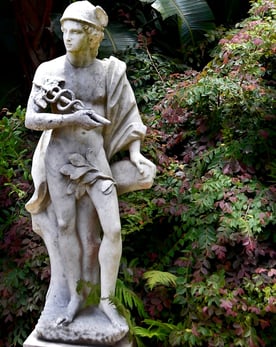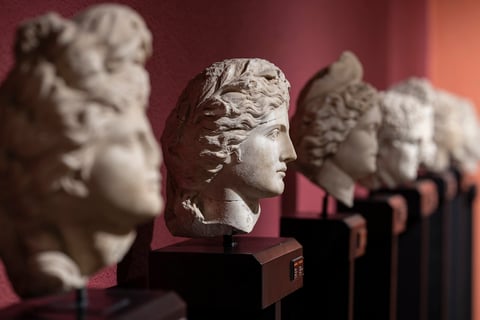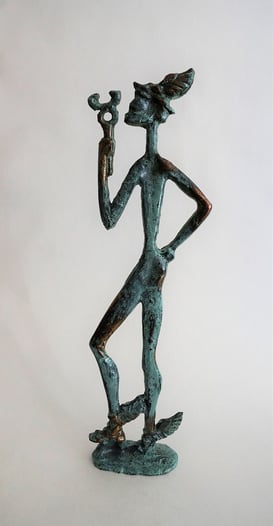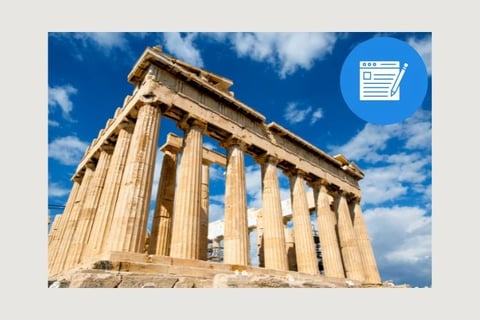Hermes: The Versatile Messenger of the Greek Gods
In this post, we will explore various aspects regarding the Greek God Hermes, the divine messenger, and patron of commerce, eloquence, and invention. Delve into his mythological origins, his impact on the Greek language and literature, and his enduring legacy in art, culture, and modern symbolism. Discover Hermes' influence on the Greek alphabet, rhetoric, and Hermetic tradition.
GREEK MYTHOLOGY
9/2/20246 min read
In the pantheon of Greek mythology, Hermes (Greek name: Ερμής) stands out as one of the most versatile and dynamic gods. Known primarily as the messenger of the gods, Hermes' influence extends far beyond that singular role. He is a god of boundaries and transitions, presiding over commerce, communication, travel, and even the delicate balance between the living and the dead. With his winged sandals and caduceus in hand, Hermes embodies the spirit of movement and fluidity, making him one of the most fascinating figures in Greek mythology.
hermes: The versatile messenger god


Origins and Birth
Hermes is the son of Zeus, the king of the gods, and Maia, one of the Pleiades and daughter of the Titan Atlas. According to mythology, Hermes was born in a cave on Mount Cyllene in Arcadia. From the moment of his birth, Hermes exhibited his cunning and resourcefulness. On the very day he was born, he escaped from his crib, sneaked out of the cave, and stole the cattle of his half-brother, Apollo. This early display of wit and trickery would come to define much of Hermes' character and his subsequent roles among the gods.
The Role of the Messenger
As the divine messenger, Hermes was tasked with carrying out the will of the gods, particularly that of Zeus. His speed and agility allowed him to move freely between the mortal world and the divine, as well as between the underworld and the heavens. This ability to traverse all realms made Hermes the perfect intermediary and negotiator. His role as the psychopomp, or guide of souls to the underworld, highlights his importance in both life and death, guiding the souls of the deceased to the afterlife, and ensuring their safe passage.
Patron of Commerce and Trade


Hermes' association with commerce and trade is deeply rooted in his identity as a god of transitions and exchanges. He is the protector of merchants, shepherds, and thieves alike, representing the various facets of trade and commerce. His caduceus, a staff entwined with two serpents, has become a symbol not only of his role as a messenger but also of commerce and negotiation. Hermes was also believed to protect travelers, ensuring their safe journeys, and was often invoked by those embarking on long trips or trading ventures.
Hermes the Trickster
Hermes' cunning nature is another defining aspect of his personality. The story of his theft of Apollo's cattle is one of the most famous examples of his trickery. After stealing the cattle, Hermes cleverly disguised their tracks by making them walk backward, confusing anyone who tried to follow them. When Apollo eventually confronted him, Hermes denied the theft with such charm and eloquence that Apollo couldn't help but admire him. In the end, Hermes returned the cattle and offered Apollo the lyre, an instrument he had invented from a tortoise shell, as a gesture of goodwill. This incident not only highlights Hermes' mischievous side but also his ability to mend relationships and turn adversaries into allies.
Inventor and Innovator
Hermes was also celebrated as an inventor and a patron of ingenuity. Beyond the lyre, which became one of the most important instruments in Greek culture, Hermes is credited with the invention of fire, the alphabet, and various forms of athletic competition. His association with athleticism was particularly significant in ancient Greece, where athletic contests were central to religious and civic life. Hermes' inventive spirit underscores his role as a god of knowledge and progress, continuously pushing the boundaries of what is possible.
Hermes and the Olympians
Hermes played a crucial role among the Olympians, not just as a messenger but as a diplomat and mediator. His diplomatic skills were essential in maintaining harmony among the gods, and his loyalty to Zeus made him one of the most trusted deities on Mount Olympus. Hermes was often involved in resolving conflicts, whether it was negotiating with mortals on behalf of the gods or settling disputes among the Olympians themselves. His ability to navigate complex situations with grace and tact made him an invaluable member of the divine assembly.


Worship and Legacy
Worship of Hermes was widespread throughout ancient Greece, with many temples and shrines dedicated to him. He was particularly revered in Arcadia, where his birthplace on Mount Cyllene was a major center of worship. Herms, stone pillars with the head of Hermes and a phallic symbol, were commonly placed at boundaries, crossroads, and doorways as a means of protection and good fortune. These markers not only signified Hermes' role as a guardian of boundaries but also his presence in the daily lives of the Greeks.
Hermes' legacy extends beyond mythology and into modern times. His image as the winged messenger has been adopted in various forms, from art and literature to symbols of commerce and medicine. The caduceus, often confused with the Rod of Asclepius, has become a symbol of medicine in modern times, a testament to Hermes' enduring influence. His role as a guide and protector continues to resonate, embodying the ideals of communication, travel, and the crossing of thresholds, both physical and metaphorical.


Hermes and the Greek Language and Literature
Hermes' influence extends beyond mythology and into the realm of language and literature, where he is revered as the god of eloquence and a patron of language. In ancient Greek culture, language was not just a tool for communication but also a powerful means of persuasion, storytelling, and the transmission of knowledge—areas where Hermes played a pivotal role.
Hermes and the invention of the Alphabet
One of the most significant contributions attributed to Hermes is the invention of the Greek alphabet. According to certain myths, Hermes devised the first letters, laying the foundation for written communication in ancient Greece. This invention was seen as a divine gift, enabling the Greeks to record their history, laws, and poetry, thus preserving their cultural heritage for future generations. The connection between Hermes and the alphabet underscores his role as a god of knowledge and communication, highlighting the importance of language in Greek society.
Hermes in Greek Literature
Hermes frequently appears in Greek literature, where his character often symbolizes cunning, eloquence, and the art of persuasion. In Homer’s Iliad and Odyssey, Hermes is depicted as a guide and protector, assisting heroes in their journeys. For instance, in the Odyssey, Hermes aids Odysseus by giving him the magical herb moly to protect him from the enchantress Circe’s spells. This act not only showcases Hermes' role as a protector but also emphasizes the power of language and wit, as Odysseus must use both to navigate the challenges he faces.
In the works of the classical Athenian playwrights, Hermes is often invoked in prologues and epilogues as a figure of speech and negotiation, embodying the persuasive power of rhetoric. His presence in these texts reflects the high regard the Greeks had for oratory skills, which were essential in public life, particularly in the courts and assemblies of democratic Athens.
Hermes and the Greek Language Today
In modern Greek, several words and expressions are derived from Hermes’ name and attributes. For example, the word “hermeneutics” (ερμηνευτική), which refers to the theory and methodology of interpretation, especially of scriptural and literary texts, is directly linked to Hermes. This connection is fitting, as Hermes was considered an interpreter of the divine will, a mediator between the gods and humans. The concept of hermeneutics has evolved over time, but its roots in the figure of Hermes highlight the enduring legacy of the god in the realm of language and interpretation.
Hermes as the Guardian of Language
Hermes' association with language, literature, and interpretation adds a rich layer to his already multifaceted character. As the inventor of the alphabet, a symbol of eloquence, and a guide to understanding, Hermes' influence on Greek language and literature is profound. For those studying the Greek language or engaging with its literary traditions, Hermes serves as a reminder of the power of words and the divine connection between language and the human experience.
To further explore the fascinating world of Greek mythology and its connections to language, culture, and history, be sure to check out our other blog posts , where we have relevant arcticles about Apollo, Dionysus and others. We regularly share new insights and stories that dive deep into the rich heritage of ancient Greece.
Don’t forget to follow us on social media for more updates, engaging discussions, and a chance to connect with fellow enthusiasts.
Join our community and continue your journey into the captivating world of Greek mythology!


#greekmythology
#greekgods
#hermes
#hermesgod
Find us on social media
© 2024. All rights reserved.
Quick Navigation
Information
Join our newsletter and download your free copy of our 'essential greek phrases cheat sheet' !
enquiries: +44 7858 148305
